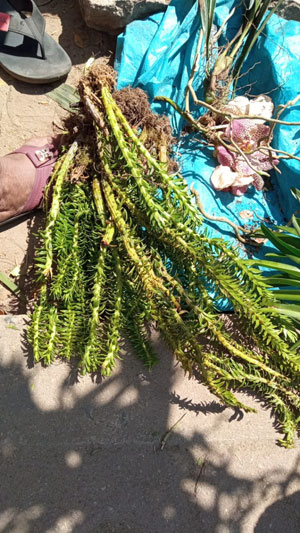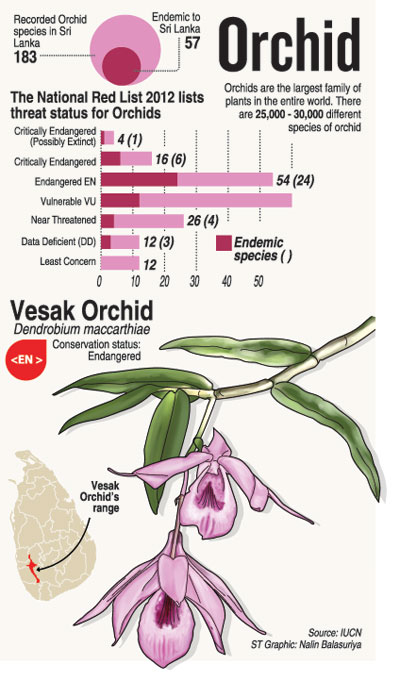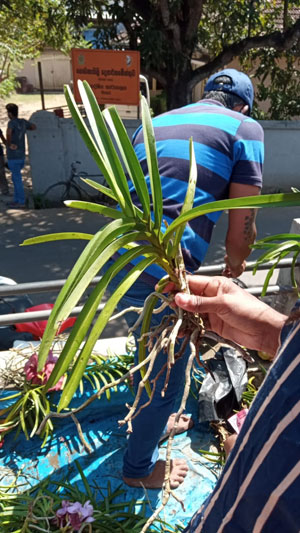News
Rare orchids stripped from forests hawked at bus stands
Thieves who were selling wild orchids stripped from forests were arrested following a tipoff, a senior wildlife officer in Mirissa said.
The Department of Wildlife Conservation Ranger in charge of the Mirissa Range Office, Chinthana Abeyratne, said two Kandy residents, Upasaka Gedara Vishwa Tharanga Piyawardana Wijenayake and Upasaka Gedara Ranjith Kumara, had been selling several indigenous orchid species at the Matara bus stand.

Rare and indigenous orchid plants sold illegally in several towns
He said the men had told buyers the orchids came from nurseries.The orchids they were selling included species such as Vanda tessellate (Rassna), Polydoda imbricata ( Nari Ala) and the highly-endangered Lycopdium plegmaria (Maha handaya).
“The suspects were selling plants extracted from forests. We found several gunny bags and cuttings of these orchids,” Ranger Abeyratne said.
The suspects appeared at the Matara Magistrate Courts on Tuesday charged with selling and exhibiting protected plant species.
They pleaded guilty and claimed they had not known the orchids were protected under the Fauna and Flora Protection Ordinance. Later, it was revealed that the orchids were supplied by a person from Nikaweratiya. The men were each fined Rs 40,000.
Sources told this paper similar sellers often attached stray blooms from expensive hybridised orchids to forest plants to boost the beauty of their illicit goods. Forest orchids are often smaller and fewer in number.
Orchid stems in such illicit sales often fetched Rs. 100-150 and were advertised on social media sites by vendors using bogus names.
In one such account, orchids were being sold for Rs. 150, while on another the same plant was apparently available for Rs 750.
The Sunday Times on January 24 reported that a person calling herself Sanu Nehansa was selling young orchid plants for Rs. 500. Following exposure in the article she changed her profile name four times.
The President of Sri Lanka Nature Conservationists and former Customs deputy director Samantha Gunasekera said wild plants were being sold in Badulla, Kurunegala, Kiribathgoda, Kelaniya and Maharagama as well as in other towns.
He said business was so brisk that such vendors sold about 12,000 plants in six months.
“Orchids are needy plants, they need beneficial bacteria to grow. Plants in the wild grow very slowly and create their own ecosystem. If those plants are stripped from their natural area they could die and so would other plants in the area. Plants need to be left undisturbed in their natural ecosystem,” Mr. Gunasekera said.
He said that the people should stop buying from people who sell orchids without potting and with broken roots as those are some of the indications of wild collected plants.

Mr. Gunasekara urged government agencies to propagate indigenous orchids and introduce them into the market, reducing demand for wild orchids.
 The National Botanical Gardens said it was already involved in the propagation of endemic and indigenous orchids as blooms were in high demand.
The National Botanical Gardens said it was already involved in the propagation of endemic and indigenous orchids as blooms were in high demand.
“From the 1950s we have hybridised more than 3,000 varieties of orchids, mainly focusing on the cut flower industry,” National Botanical Gardens Director General Dr. Shelomi Krishnarajah said. “As we have the technology for propagation we are also planning to hybridise and propagate new varieties of orchids for home gardening and export.”
She revealed officers had propagated Vesak orchid flowers (Dendrobium maccarthiae) in laboratories and reintroduced plants to forests as a project carried out by students.
Dr. Krishnarajah said orchid seeds found on the forest floor could be collected and easily propagated, and endangered plants reintroduced into the wild.


